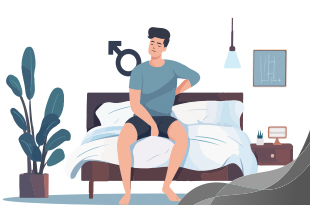Does Testosterone Help With Weight Loss? What Science Really Says
The hormone commonly associated with the male reproductive system is named testosterone, but it is much more than that. It is essential to complete well-being and impacts muscle, bone, and fat tissues, mood, and even the location of fat deposits. The question many are asking today is “Does it mean that taking testosterone aids in weight loss? And “Does testosterone burn fat?”
This blog post will review what is known about testosterone, can testosterone burn fat, TRT, will testosterone help you lose weight, and weight loss.
Understanding The Role Of Testosterone In the Human Body
To see how testosterone impacts weight, one should know the role of the hormone first of all. In men, testosterone is mainly synthesized within the testes, though in females the production is from the ovaries in small amounts. It comes under a category namely androgens responsible for the development of male characteristics. However, testosterone also plays a crucial role in both men and women by affecting:
- Muscle Mass: Testosterone is used in the development of lean muscles which are significant in the metabolism process.
- Fat Distribution: It decides where fat deposits are in the body whereby high concentration is linked to less abdominal fat and increased lean muscle tissue.
- Metabolism: The hormone also increases lean muscle mass, accelerating the rate at which the body metabolizes food and other molecules.
- Energy Levels: Moreover, recent research indicates that if a person receives excessive amounts of testosterone they will be more energetic and more desired to perform physical activities that lead to weight management.
READ MORE: Testosterone Replacement Therapy Before and After: Is It That Effective?
The Link Between Testosterone And Weight Gain
This is one of the reasons why testosterone is linked with weight loss has to do with the fact that it has a direct link with fat deposition. In men, as they grow old, the testosterone level decreases regardless of the cause. This of course normally results in the loss of muscle strength and an increase in fat storage particularly around the waist. This weight gain isn’t just troubling it also increases the risk of serious health conditions, including:
- Cardiovascular diseases
- Type 2 diabetes
- Metabolic syndrome
Obesity is also associated with hypogonadism, that is, low levels of testosterone production in the body. This just makes the circle a vicious one since if one gains a lot of body fat, then their testosterone level will also decrease. Because fat tissue contains an aromatase enzyme that converts testosterone into estrogen, more effect is to reduce the body’s testosterone levels. The greater the adipose tissue, the higher this conversion takes place which decreases testosterone, increases fat, and reduces muscles.
How Can Testosterone Affect Weight Loss?
Does testosterone cause fat loss, or does it aid in weight gain? There isn’t an easy one-word answer to that question. Now, we will look at the various factors that make it easier for testosterone to help in the loss of weight.

Increased Muscle Mass
Testosterone is also known to positively regulate lean muscle mass; this is one of the most well-known effects of testosterone. Therefore, you burn more calories even when you are not exercising. Generally, any individual who has more muscle will require a higher BMR than a normal person. In this way, testosterone can indirectly help a person lose weight because a person with more muscle will burn more calories every day, including while at rest.
Improved Fat Distribution
It has been greatly noted that this hormone plays a critical role in determining where body fat is deposited. Lean body mass is proportionally more in the lower body and less around the abdomen in the man with higher testosterone levels, while fat accumulation more particularly around the abdomen is common in men with lower testosterone levels. Of course, central (abdominal) fat is significantly more dangerous because it leads to a higher risk of metabolic and cardiovascular diseases.
Increased testosterone levels enable the reshaping of a body’s fat deposition, favoring the mobilization of the pathogenic, unhealthy visceral fat and improving adipose tissue quality and/or quantity of favorable lean muscle mass.
Increased Metabolism
Testosterone has positive impacts on metabolism. Elevated levels of testosterone also increase the metabolic rate at which the body uses the calories for energy, to digest food, and throughout the day. More important for understanding fat utilization, however, is the contribution that this increased metabolism makes to the process when other aspects of weight loss are considered.
Energy Levels and Motivation
Testosterone impacts energy and mood, men who have more testosterone will generally have more energy, be more motivated, and be able to sustain this for longer. Having high levels of testosterone increases energy and the tendency to have high levels of physical activity such as exercising. Physical exercise is mandatory for weight loss and is considered under weight loss solutions. Those with higher testosterone counts are more likely to engage in more physical activities, which leads to calorie shedding.
Insulin Sensitivity
Testosterone has been found to enhance insulin sensitivity. Of course, insulin is the hormone that stabilizes sugar levels, and improved insulin sensitivity allows the body to metabolize sugars rather than store them as fat. Because insulin is involved in the storage of fat, enhanced insulin sensitivity can reduce the prospective weight gain and even contribute to weight loss since the body system will be in a position to generate better utilization of energy from foods.
READ MORE: Hormone Replacement Therapy and Weight Loss: What’s The Connection?
Testosterone Replacement Therapy (TRT) and Weight Loss
Men with low testosterone levels are usually treated with Testosterone replacement therapy abbreviated as TRT. TRT and weight loss are linked together. This can be by shots, patching, solidifying, or any other way used to put testosterone in the body. The most common application of TRT is primarily for the symptoms associated with low testosterone and this encompasses low sexual desire, tiredness, and frequent mood swings, but some studies have pointed to the possibility of use of TRT for weight loss too.
Research on TRT and Weight Regression
Several investigations have been carried out about body weight and composition with subjects under TRT. Many scientific studies show that men under testosterone replacement therapy were able to shed substantial amounts of body fat and gain some lean body mass. A similar study showed that lean men losing an average of 5 kg per year of TRT subsequently experienced a decrease in body fat by 15% over several years.
These studies show the potential of using TRT to reduce fat and increase muscle but it is noteworthy that testosterone therapy does not equal fat loss solution. It requires the support of other behavioral modifications, the most important of which are diet and exercise.
The Role of Lifestyle Factors
It implies that testosterone injection alone will not result in exaggerated loss of body weight (fat) without companion effects of a proper lifestyle. Nutrition changes physical activity, hours of sleep that a person receives, and their ability to handle stress all determine the amount of weight a person can lose.
Diet
There is a need to eat foods that are whole and natural and that include proteins, vegetables, and fats to keep the testosterone levels per/be healthy. Saturated fats, processed foods, and an excessive intake of refined sugar present in most take products are well-known suppressors of testosterone production.
Exercise
Resistance training such as weight training exercise has been believed to be one of the best and natural ways of boosting testosterone levels in the body. Cardiac activities overall are good for the heart muscles but should be supplemented with strength training exercises for effacing fats and building up muscle mass.
Sleep
Lack of sleep decreases body testosterone and also leads to increased weight. It also helps to have at least 7-8 hours of sound sleep in a day to regulate hormone balance and help with efforts to lose weight.
Stress Management
Stress raises cortisol levels which in turn reduces testosterone levels. Learning how to reduce stress in any way possible whether it be through relaxation, exercise, or meditation will go a long way in maintaining a healthy level of testosterone and encouraging weight loss.
READ MORE: Men’s Health and Wellness At Any Age
Summary!
Testosterone is an important male hormone that is responsible for the development of new muscles, the alteration of the fat patterns and the speeding up of metabolic patterns. TRT has the ability to decrease body adiposity and increase lean body mass in men with low testosterone concentrations. However, for steady shedding of the pounds, then creating and living a healthy lifestyle is crucial as it entails proper diet, exercise, sleep, and stressed management. Testosterone is not a magic bullet for weight loss, but it can help with your endeavors in this regard. If you are looking for an answer about whether testosterone helps lose weight or not, then you are at the right platform. Consult Revive Men’s Health experts today and unlock your full potential with tailored care.



